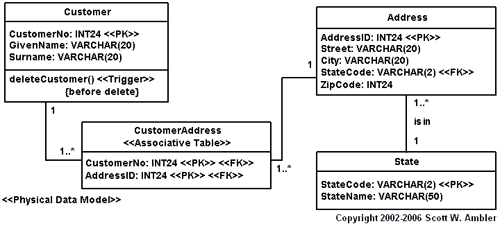CSC/ECE 517 Summer 2008/wiki3 1 ar: Difference between revisions
(→Links) |
|||
| Line 3: | Line 3: | ||
= Introduction = | = Introduction = | ||
This article deals with merging two software development models. Most of data are already stored in relational databases that are modeled around relational models. But all new development is being done in some Object Oriented language. Software design patterns are providing a solution in terms of ORM (Object Oriented Mapping) to merge these two models. | |||
In this article first I will set the stage by giving some background information about the relational model and object oriented models and their differences. After this I will briefly discuss the philosophical approaches to merge them together. By then user should have a good understanding of the problem and techniques to solve it, now it is time to show some design patterns that solve this problem in very elegant way. I will pick two major design patterns that are mostly used by development teams. | |||
= Relational Vs Object-Oriented Models = | = Relational Vs Object-Oriented Models = | ||
== Relational Models == | == Relational Models == | ||
Revision as of 16:30, 25 July 2008
WIKI Topic - RDB/OO patterns
- It would be good if OO programs could interact with OO databases, but alas, relational databases have a 99% market share. This has led to many attempts to access them from OO languages. Design patterns for doing this have been developed, starting with Crossing Chasms and extending to Rails' ActiveRecord [1][2]. Here, we investigate the various approaches for marrying OO programs to relational databases, comparing them in terms of ease of programming, robustness, and efficiency.
Introduction
This article deals with merging two software development models. Most of data are already stored in relational databases that are modeled around relational models. But all new development is being done in some Object Oriented language. Software design patterns are providing a solution in terms of ORM (Object Oriented Mapping) to merge these two models.
In this article first I will set the stage by giving some background information about the relational model and object oriented models and their differences. After this I will briefly discuss the philosophical approaches to merge them together. By then user should have a good understanding of the problem and techniques to solve it, now it is time to show some design patterns that solve this problem in very elegant way. I will pick two major design patterns that are mostly used by development teams.
Relational Vs Object-Oriented Models
Relational Models
Object-Oriented Models
Differences between Relational Vs Object-Oriented Models
Mismatches
Techniques for merging Relational and OO models
Minimize the differences
Compensation
Object/Relational Mapping (ORM) Patterns
Conclusion
Links
- http://en.wikipedia.org/wiki/Object-relational_mapping
- http://www.theserverside.com/news/thread.tss?thread_id=40581
- http://www.objectarchitects.de/ObjectArchitects/orpatterns/orindex.htm
- http://martinfowler.com/eaaCatalog/
- http://en.wikipedia.org/wiki/Object-Relational_impedance_mismatch
- http://www.lhotka.net/Article.aspx?id=ff226256-903f-4aee-a921-8b09ef40901b
- http://en.wikipedia.org/wiki/Object-relational_database
- http://gilbane.com/ctoblog/2007/09/relational-and-objectoriented.html
- http://www.geocities.com/tablizer/core1.htm
- http://c2.com/cgi/wiki?RelationalModel
- http://www.agiledata.org/essays/impedanceMismatch.html
- http://en.wikipedia.org/wiki/ActiveRecord_%28Castle%29
